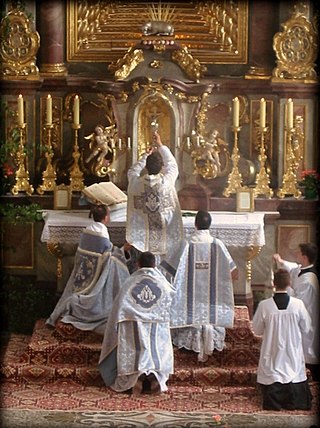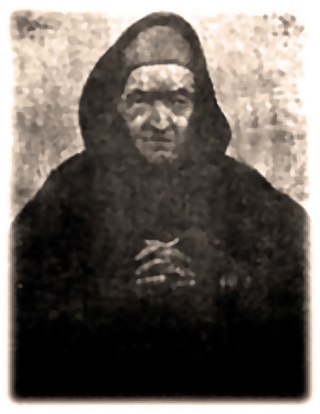History
The Council of Trent (Sess. XXIII, chap. xvi on Reform) lays down the rule that "no cleric who is a stranger shall without letter commendatory from his own ordinary be admitted by any bishop to celebrate the divine mysteries". Ordinarily permission is not to be given to a priest from another diocese to say Mass without this certificate signed and duly sealed.
The seal is obviously the more important requisite, as it is the safer guarantee against forgery. The celebret should be officially recognized by the diocesan authority of the place where a priest may wish to say Mass. One who has his celebret in due form, or who is certainly known to be in good standing in his own diocese, may be allowed to celebrate until he has had a sufficient time to comply with this rule. A priest with proper credentials cannot reasonably be prevented from saying Mass, though he will be expected to comply with reasonable restrictions which may be imposed.
In the U.S, the Third Plenary Council of Baltimore, as a regulation against collectors of funds for other dioceses or countries, enacted a decree (No. 295) that priests on such a mission should not be allowed to celebrate Mass even a single time until they had received permission from the ordinary. This rule has generally been enforced in diocesan synods.
The absence of the celebret does not suffice for the refusal of permission to say Mass, if persons worthy of belief bear positive testimony to the good standing of the priest. If the permission is unreasonably refused, the priest may say Mass privately, if no scandal is given. Yet the rectors of churches are not obliged to incur any expenses the celebration may involve. (S.C.C., 15 December 1703).

The Tridentine Mass, also known as the Traditional Latin Mass, the Traditional Rite, or the Extraordinary Form, is the liturgy in the Roman Missal of the Catholic Church codified in 1570 and published thereafter with amendments up to 1962. Celebrated almost exclusively in Ecclesiastical Latin, it was the most widely used Eucharistic liturgy in the world from its issuance in 1570 until the introduction of the Mass of Paul VI.

Traditionalist Catholicism is a movement that emphasizes beliefs, practices, customs, traditions, liturgical forms, devotions and presentations of teaching associated with the Catholic Church before the Second Vatican Council (1962–1965). Traditionalist Catholics particularly emphasize the Tridentine Mass, the Roman Rite liturgy largely replaced in general use by the post-Second Vatican Council Mass of Paul VI.

The Society of Saint Pius X is a canonically irregular traditionalist Catholic priestly fraternity founded in 1970 by Archbishop Marcel Lefebvre. Lefebvre was leading traditionalist at the Second Vatican Council with the Coetus Internationalis Patrum and Superior General of the Holy Ghost Fathers until 1968. The society was initially established as a pious union of the Catholic Church with the permission of François Charrière, the Bishop of Lausanne, Geneva and Fribourg in Switzerland.

An altar server is a lay assistant to a member of the clergy during a Christian liturgy. An altar server attends to supporting tasks at the altar such as fetching and carrying, ringing the altar bell, helping bring up the gifts, and bringing up the liturgical books, among other things. If young, the server is commonly called an altar boy or altar girl. In some Christian denominations, altar servers are known as acolytes.

The Priestly Fraternity of Saint Peter is a traditionalist Catholic society of apostolic life for priests and seminarians. It is in communion with the Holy See. It was founded in 1988 by 12 former members of the Society of Saint Pius X (SSPX) who left following the Écône consecrations, which resulted in the SSPX bishops being excommunicated by the Holy See.
The hierarchy of the Catholic Church consists of its bishops, priests, and deacons. In the ecclesiological sense of the term, "hierarchy" strictly means the "holy ordering" of the church, the Body of Christ, so to respect the diversity of gifts and ministries necessary for genuine unity.
The Pastoral Provision is a set of practices and norms in the Catholic Church in the United States, by which bishops are authorized to provide spiritual care for Catholics converting from the Anglican tradition, by establishing parishes for them and ordaining priests from among them. The provision provides a way for individuals to become priests in territorial dioceses, even after Pope Benedict XVI's apostolic constitution Anglicanorum Coetibus established the Personal Ordinariates, a non-diocesan mechanism for former Anglicans to join the Church.

Frank Anthony Pavone is an American anti-abortion activist and former Catholic priest. He is the national director of Priests for Life and the chairman and pastoral director of its Rachel's Vineyard project. He is also the president of the National Pro-Life Religious Council, an umbrella group of various anti-abortion Christian denominations, and the pastoral director of the Silent No More campaign.

The Congregation of the Sons of the Most Holy Redeemer, commonly known as The Sons and The Transalpine Redemptorists, are a religious institute of the Catholic Church canonically erected in the Roman Catholic Diocese of Aberdeen and based on Papa Stronsay in the Orkney Islands, Scotland, as well as in the city of Christchurch, New Zealand, until July 2024. They were formed in 1988 as a traditionalist offshoot of the Redemptorists, following a monastic rule based on that of Saint Alphonsus Liguori, and was later formally erected as a religious institute in 2012.
The Pontifical Commission Ecclesia Dei was a commission of the Catholic Church established by Pope John Paul II's motu proprioEcclesia Dei of 2 July 1988 for the care of those former followers of Archbishop Marcel Lefebvre who broke with him as a result of his consecration of four priests of his Society of St. Pius X as bishops on 30 June 1988, an act that the Holy See deemed illicit and a schismatic act. It was also tasked with trying to return to full communion with the Holy See those traditionalist Catholics who are in a state of separation, of whom the Society of Saint Pius X (SSPX) is foremost, and of helping to satisfy just aspirations of people unconnected with these groups who want to keep alive the pre-1970 Roman Rite liturgy.

The Personal Apostolic Administration of Saint John Mary Vianney was established on 18 January 2002 by Pope John Paul II for traditionalist Catholic clergy and laity within the Diocese of Campos in Brazil. It is the only personal apostolic administration in existence, and the only canonically regular Catholic Church jurisdiction devoted exclusively to celebrating the pre-1965 form of the Roman Rite in the area. Its current Apostolic Administrator is Bishop Fernando Arêas Rifan.

The Mass is the central liturgical service of the Eucharist in the Catholic Church, in which bread and wine are consecrated and become the body and blood of Christ. As defined by the Church at the Council of Trent, in the Mass "the same Christ who offered himself once in a bloody manner on the altar of the cross, is present and offered in an unbloody manner". The Church describes the Mass as the "source and summit of the Christian life", and teaches that the Mass is a sacrifice, in which the sacramental bread and wine, through consecration by an ordained priest, become the sacrificial body, blood, soul, and divinity of Christ as the sacrifice on Calvary made truly present once again on the altar. The Catholic Church permits only baptised members in the state of grace to receive Christ in the Eucharist.
The Provincial Councils of Baltimore were councils of Roman Catholic bishops that set the pattern for Catholic organisation in the United States. They took place in Baltimore. They were seen as having a unique importance for the Church in the United States, inasmuch as the earlier ones legislated for practically the whole territory of the Republic, and furnished moreover a norm for all the later Plenary Councils of Baltimore covering the whole country. This article touches upon only those parts of the canonical legislation which may seem in any way to individualize the discipline of the Church in the United States or depict the peculiar needs and difficulties of its nascent period.

In the Catholic Church, a bishop is an ordained minister who holds the fullness of the sacrament of holy orders and is responsible for teaching doctrine, governing Catholics in his jurisdiction, sanctifying the world and representing the Church. Catholics trace the origins of the office of bishop to the apostles, who it is believed were endowed with a special charism and office by the Holy Spirit at Pentecost. Catholics believe this special charism and office has been transmitted through an unbroken succession of bishops by the laying on of hands in the sacrament of holy orders.
Summorum Pontificum is an apostolic letter of Pope Benedict XVI, issued in July 2007. This letter specifies the circumstances in which priests of the Latin Church could celebrate Mass according to what Benedict XVI called the "Missal promulgated by Blessed John XXIII in 1962" and administer most of the sacraments in the form used before the liturgical reforms that followed the Second Vatican Council.

The altar in the Catholic Church is used for celebrating the Sacrifice of the Mass.
The canonical situation of the Society of Saint Pius X (SSPX), a group founded in 1970 by Archbishop Marcel Lefebvre, is unresolved. The Society of Saint Pius X has been the subject of much controversy since 1988, when Bernard Fellay, Bernard Tissier de Mallerais, Richard Williamson and Alfonso de Galarreta were illicitly consecrated at Ecône, at the International Seminary of Saint Pius X as bishops in violation of canon law. Lefebvre and the four other SSPX bishops individually incurred a disciplinary latae sententiae excommunication for the schismatic act; the excommunications of the four living SSPX bishops were remitted in 2009.

Jean-Claude Courveille, born in Usson-en-Forez on May 15, 1787, and died on September 25, 1866, in Solesmes, was a French Catholic priest.
Traditionis custodes is an apostolic letter issued motu proprio by Pope Francis, promulgated on 16 July 2021 regarding the continued use of pre-Vatican II rites. It restricts the celebration of the Tridentine Mass of the Roman Rite, sometimes colloquially called the "Latin Mass" or the "Traditional Latin Mass". The apostolic letter was accompanied by an ecclesiastical letter to the Catholic bishops of the world.

In the Catholic Church, preconciliar Latin liturgical rites coexist with postconciliar rites. In the years following the Second Vatican Council, Pope Paul VI initiated significant changes. Some of Paul VI's contemporaries, who considered the changes to be too drastic, obtained from him limited permission for the continued use of the previous Roman Missal. In the years since, the Holy See has granted varying degrees of permission to celebrate the Roman Rite and other Latin rites in the same manner as before the council. The use of preconciliar rites is associated with traditionalist Catholicism.












